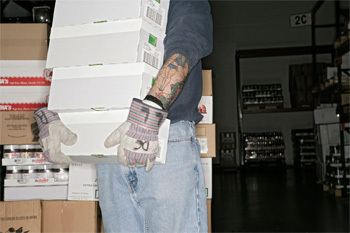5 Disturbing Things I Learned in Scientology's 'Space Navy'

The Sea Org is Scientology's answer to Navy SEALs, only with less focus on special ops and more on fleecing children and the gullible. They were originally created to crew L. Ron Hubbard's private fleet, but over the years they morphed from "religious Marine Corps" into something between a cult, the Mickey Mouse Club, and a time-share scam. My name is Derek Bloch, and I spent three years in Scientology's creepy space navy before abandoning ship. Here's what I learned:
They Specifically Target Children

My early indoctrination was based on "study tech," which mostly involved learning the definitions of words you don't understand, using toys to act out concepts that are difficult to contemplate, and never skipping over a step in a series for fear of being incapable of performing later tasks. Here's where it gets dumb: These "study tips" are also religious dogma. So if you ever skip one, you risk physical illness or a sudden descent into crime. "Not looking up words in the dictionary" was the meth of my childhood.
I was about 13 when the local Sea Org recruiters smelled blood. The Sea Org is always on the lookout for the young and able-bodied. The long hours and harsh treatment require deeply indoctrinated children who aren't resistant to recruiting techniques and won't burn out. I was already perfectly groomed for them.

"We're going to work you like a stock boy on Black Friday. Every day."
The Sea Org, from an uninformed child's perspective, looked totally badass. No, they don't look awesome now, but when I was a kid, these guys were like the Power Rangers to me. I had been raised to believe the Sea Org was guarding the innermost secrets of Scientology and personally responsible for delivering the messages of founder L. Ron Hubbard from beyond the grave, both of which would save the world one day. I was even raised to believe that they'd be a space navy with special reincarnation powers. Holy mission to protect humanity, one foot in the supernatural, and secret powers? That's the perfect storm for snaring the interest of children. Just look at the poster:

If they'd been wearing Aviator sunglasses, the poster would've literally caught fire from radness.
But while you grow up learning that Hubbard had sacred secrets that would save the world and that the Sea Org has a huge role to play in it, after joining you soon find out that most of what they do are menial tasks. My jobs involved filing papers, making phone calls, writing, and reading. There was absolutely nothing "awesome" about being a slave to other Scientologists and to the almighty dollar. They ... they lied about the space navy, you guys. That alone is an unforgivable betrayal, but to sign up for the elite defense force, only to realize that most people treat Sea Org members as pseudo-military butlers? You'd be hard-pressed to find that kind of heartbreak outside of a Telemundo soap opera.
If the Recruitment Methods Aren't Illegal, They Should Be

The recruiting process lasted about two years. At the peak of it, when I was 15, they showed up as I was leaving school. I tried to ditch them by taking a different route, but eventually I ended up on the main street again. They pulled up next to me and offered to give me a ride home. Ordinarily this is where the kid in the PSA runs away screaming for an adult, but having been taught that these guys are like the police of Scientology, I trusted them. After some protesting, I even got in the car. Of course, instead of taking me home, they took me straight to the recruiting station, where I spent the next eight or nine hours. They took me into a small room, sat me away from the door, and stood between me and my exit.

"But what if I have to pee?"
"Pee on this, and see if you can spell your name."
There was nothing that was even mildly stimulating in the blank room; not even a clock. I wouldn't leave that room until midnight or one in the morning. I lost track of time and begged them to call my dad several times, but I was denied. There were up to 10 people in the room at any given time, switching between shouting at and begging me to sign the billion-year contract they had put in front of me. Yes, "billion." At an age where planning the rest of your Saturday is an unfathomable exercise in foresight, they want you to essentially sign away your soul. And you don't even get a sweet fiddle out of the deal.

Most devious of all was the guy quietly saying "Signsthecontractsayswhat."
When I was finally released, my dad was waiting for me. Instead of greeting me with relief, he shouted at me because I hadn't called him. It only took another one or two "meetings" for them to break me. Pro Tip for all the religions out there: If you have to "break" people to make them join you, you're almost certainly the bad guys.
Once You're In, They Own You

When I was 15, my mom and dad signed over their parental rights to a member of the Sea Org who was also the guardian for about 20 other kids. I hardly ever spoke to him again after the recruiting process. His job description was literally to own children for Scientology. I lived in a big two-wing building on L. Ron Hubbard Way, across the street from where I worked at the Advanced Organization, in a room with 30 to 40 other males ranging from 13 to 70 years old. The windows were broken, there was no AC, and the place stank. I lived there for almost three years. When I got sick, I was moved to a room called "Iso," which is short for "isolation." It had fewer people, but when you're sharing a single bathroom and dirty mattresses with a bunch of guys suffering from stomach flu, you realize you'd trade "a bit of a crowd" for "not covered in atomized poop" any day of the week.

"Misery loves company" seldom shows up on prescription pads for a reason.
There's no time for socialization or friends. Days off are a joke. I think I had one day off per year the whole time I was working for them. You don't get a paycheck, so no one can afford entertainment (ironic for a "religion" that seems to own half the entertainment industry). But even if you did have the money, you weren't generally allowed to leave the compound unless you were on official Scientology business. Tom Cruise tooth-polishing, for example. Maybe the occasional backup vocal for one of Will Smith's feel-good raps. Ha, kidding, of course: Both of those could be distantly construed as "fun," which was of course not permitted.

You still got to hang out with some famous Scientologists, just not the ones in the brochure.
How is this not against the law? Well, by claiming to be a religious organization, Scientology does not have to pay their employees. They do give you $20 a week as what they call a stipend, but when you realize that $20 a week is all you get for underwear, socks, toilet paper, toothpaste, toothbrush, detergent, soap, wash rags, towels, bath slippers, shoes, socks, and everything else, it's clear that the difference between you and an actual slave isn't nearly as wide as it should be. Theft of personal belongings was rampant across the Sea Org; deodorant and floss were to us what cigarettes are to prison inmates. (Oh boy, to be in prison -- imagine all the down time, all the great books you'd get to read!)

Just imagine having so many possessions, you can spare one to make a shiv.
And if you're wondering how a hack sci-fi writer conned his way into owning people, you need only refer to the time L. Ron Hubbard had his church infiltrate the American government. The operation was discovered, and his wife convicted. Hubbard somehow remained an unindicted co-conspirator even though he had directed the entire thing. After that, they managed to bully the IRS into submission to gain 501(c)(3) tax-exempt status in 1994. Yes, the Church of Scientology successfully bullied the IRS. Who do you even root for? It's like watching a Nazi beat up a Klansman.
You Help Them Shake People for Money

At one point during my three years in the Sea Org, I was assigned to assist the salespeople, called Registrars. I'd bring believers in to be endlessly harassed to hand over money for services and materials. People would take out second and third loans on their homes at the insistence of the Registrars.
I witnessed Registrars taking out credit cards in other peoples' names. They'd be on the phone with the credit card company while the person gave us the information we needed to raise their limit or get a new card. Why would you possibly go along with what is essentially a telecommute mugging? Because if you didn't comply, you'd have to go to Ethics -- the ominously titled enforcement bureau -- where they forced shameful confessions out of you: How often you jerked off, what drugs you did, which Fresh Prince albums you thought were "just all right."

At which point you may be required to get jiggy wit' it before witnesses.
You know, all of the truly unspeakable transgressions.
They Record Everything

I knew I was gay when I hit puberty at 12. My dad made his feelings about gays well known, and Scientology is also seriously homophobic, so even at a young age, I knew that I wouldn't be accepted. I was trying to hide this secret the entire time I was going through the aforementioned re-education programs, which is what kept me from raising too much of a fuss for those three years. I think everyone has a secret like that, something they want to stay private: your sexuality, your doubts, how hard you cried during the moving finale of The Smurfs movie. The church leaders know you have a private shame hidden away somewhere, and they try to find that secret for every member.

"He likes yellow Starbursts."
Eventually I wound up at Flag (Scientology's headquarters) in Clearwater, Florida, for training at age 17. I was in this studio-size hotel room converted into a six-person dorm. There was another guy in the room with whom I formed a relationship. We didn't do anything super sexual, but it was intimate enough that I'm not comfortable saying more, even to the notoriously tight-lipped and trustworthy Internet. Another member in the dorm found out what was going on, wrote a long report, and submitted it to Ethics. This is the part of the dystopian sci-fi film where our hero leaps out of a window onto a helicopter, pursued by sinister, sunglasses-wearing Re-education Agents.

Just like a scene out of a Tom Cruise movie, ironically enough.
Instead, I was sent back to LA and called in front of a small group of people who were tasked with officially telling me that I was guilty of being ... well, me. They kicked me out of the Sea Org entirely just after my 18th birthday, at which point my family followed standard Scientology procedure and accused me of being a child molester. Dad threatened to disown me and throw me out on the street. I literally had nowhere to go, so out of necessity I learned to keep quiet and internalize all my feelings. I knew that I needed a source of income in order to survive, and I was still technically a Scientologist. After I told him I'd be paying rent, my dad leveraged his Scientology connections to get me work. I spent a couple of years acquiring experience and then used it to get a job not connected to a strange Hollywood cult created by a third-rate science-fiction author.

No offense to any Lucasists.
Eventually, after eight years, I had finally built a sustainable life away from my Scientology family with a group of friends who treated me like real family. In early 2012, I discovered the Ex-Scientologist Message Board and wanted to share my story. I asked my friend if she and her husband would let me live with them should my parents find out that I posted my story. They told me to go ahead and move in right away, but I decided to wait, because I wanted to see if it was true that Scientology monitored the Internet for dissent. Sure enough, a couple of months later, my parents had the story in their hands. They told me I had been declared a Suppressive Person (because if there's one thing sci-fi writers are good at, it's ominous-sounding designations). My parents, sister, and brother turned their backs on me at the behest of Scientology in April of 2012.
It's been just about two years since I've spoken with any of them, but that's OK. I have friendships now that aren't based on a crazy space cult. And now that I'm out, I know that there aren't millions of loyal Scientologists standing arm in arm across the world. There are barely even 25,000 in the United States. And now there's one fewer.
Derek's original coming out story was published by Tony Ortega, an accomplished investigative journalist who has been reporting on Scientology since the early 1990s. Derek also has a YouTube Channel if you'd like to know more about his story.
Robert Evans is sort-of a journalist, he guesses. If you'd like to tell him your story, he can be reached here.
Related Reading: Cracked also spoke with a young woman who was raised in the Church of Scientology. We've made a habit of talking to people who grew up in dark situations, like this woman who was raised in a Christian fundamentalist cult. We went behind the scenes of a weight loss infomercial and even covered the recent Ukrainian revolution.
